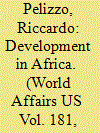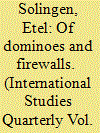|
|
|
Sort Order |
|
|
|
Items / Page
|
|
|
|
|
|
|
| Srl | Item |
| 1 |
ID:
163920


|
|
|
|
|
| Summary/Abstract |
The purpose of this article is to analyze Africa’s progress along the developmental path in the past few decades, to understand what factors were responsible for such success and to identify the risk factors that may compromise further development in the region in the years to come. We advance three basic claims: that Africa has experienced an almost unprecedented (by its standards) level of economic success in the first 15 years of the new millennium, that this success was made possible by a combination of domestic and supranational conditions, and that some of the enabling conditions that supported Africa’s growth and development in the new millennium may be disappearing. The study also suggests that while African countries may not be able to influence the global conditions on which their economic success depends, they do have the ability to influence the domestic conditions. This is why, we suggest, in addition to ensuring longer and healthier lives for their citizens, African countries should consolidate democracy and promote good governance.
|
|
|
|
|
|
|
|
|
|
|
|
|
|
|
|
| 2 |
ID:
118167


|
|
|
|
|
| Publication |
2012.
|
| Summary/Abstract |
The Great Recession, Euro contagion, Middle East upheavals, nuclear proliferation, and expansion of rights, among others, highlight the centrality of diffusion to international studies. This Presidential Address outlines building blocks for a shared conceptualization of diffusion that is attentive to the initial stimulus; the medium through which information about the stimuli may/may not travel to other destinations; the political agents un/affected by the stimulus' positive or negative externalities, who aid or block the stimulus' journey to other destinations; and outcomes that enable discrimination among grades of diffusion and resulting equilibria. Various issue areas illustrate how initial stimuli may/may not change preferences, transform identities, trigger emotions, alter strategic choices, and affect outcomes. I advance three related considerations. First, to avoid selection bias, understanding what does not diffuse (the "Vegas counterfactual") should be as central as what does. Concepts such as firewalls and sedimentation are essential for gauging a medium's relative immunity/vulnerability to diffusion. Second, weaving domestic, regional, and global considerations into a single analytical framework reduces omitted variable bias and enables systematic cross-regional comparisons. Third, these building blocks imbue the study of diffusion with political dynamics-entailing strategic interaction, contingency, incomplete information, and unintended effects-that defy determinism, automaticity, or teleology. Similar causal mechanisms may yield different outcomes under different domestic, regional, and global conditions. And different mechanisms may yield similar outcomes under comparable circumstances. I highlight the challenges inherent in assessing the outcomes of diffusion given competing empirical findings, epistemologies, and normative readings of what does/does not and should/should not diffuse, and outline an agenda for future research.
|
|
|
|
|
|
|
|
|
|
|
|
|
|
|
|
|
|
|
|
|